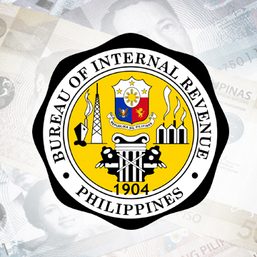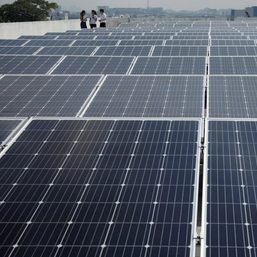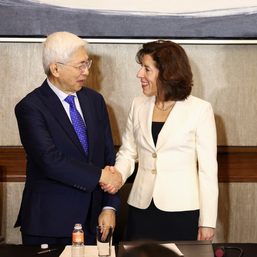SUMMARY
This is AI generated summarization, which may have errors. For context, always refer to the full article.
![[Point of Law] Investor protection, not tax collection](https://www.rappler.com/tachyon/2023/08/tl-investor-protection.jpg)
The trading suspension imposed on Holcim, a publicly listed company, has given rise to a pressing concern that threatens the rights and interests of the investing public.
Not only has the trading suspension limited shareholders’ ability to freely sell their shares in the stock market for no fault of their own, it has also imposed an unjust obligation to pay capital gains tax and fulfill administrative requirements for selling their shares in response to a tender offer.
This lingering issue stems from a revenue regulation, promulgated during the term of Commissioner Kim Henares, that the sale of listed shares during trading suspension is subject to capital gains tax.
The revenue regulation is of doubtful validity as it penalizes the investing public for the failure of a listed company to maintain the minimum public ownership required by the PSE.
It is similar to sending a son to prison for a crime committed by his father. It violates the due process clause of the Constitution for being oppressive and unreasonable.
Demanding that the investing public pay capital gains tax and undergo the rigorous process of completing administrative procedures for no fault of their own is fundamentally unfair. This burden infringes upon the rights of the investing public who bought their shares through the PSE relying in good faith that they could freely sell their shares at the least cost and inconvenience.
It is penalizing a person for the fault of another. There is an inherent injustice in the situation.
Proposal
The PSE may want to consider lifting the trading suspension temporarily to make way for the sale of the tendered shares in response to the tender offer. And it should forego a ruling from the Bureau of Internal Revenue (BIR) as a condition to lifting the trading suspension.
It is crucial to note that the trading suspension at issue is governed by the PSE rules, and the BIR had no participation in their enactment. Waiting for the BIR’s ruling would lead to undue delay and further prejudice Holcim shareholders. The fact that a third party institution may be engaged to take care of the BIR filings and exemption will not detract from the fact that delays will necessarily ensue, an evil that can be prevented if the shares are sold through the PSE trading facilities.
The PSE, as the governing authority responsible for regulating the stock market, may want to exercise its autonomy independently of the BIR for the protection of the investing public.
In a 2022 case where the Securities and Exchange Commission (SEC) and PSE were parties, the Supreme Court ruled that the authority of the SEC does not extend to enforcing tax laws and regulations. By not lifting the trading suspension, the PSE would effectively enforce the capital gains tax on Holcim shareholders and risks encroaching upon matters that are beyond its authority.
This not only contradicts the Supreme Court’s decision but more importantly, it prejudices the investing public whose protection is held sacred under our laws.
Protecting shareholder rights
In my opinion, upholding shareholder rights and ensuring the fairness of the capital market should be the central focus of the PSE on this issue. I personally believe that the government will not have any cause of action against the PSE for lifting the trading suspension even without prior exemption or approval from the BIR.
The PSE will be doing it to protect the investing public, which it is duty-bound to protect under our securities laws. In any event, if the PSE sees it fit to further protect itself, it should seek the assistance of the SEC as its rules are approved by it.
Significantly, our tax code is crystal clear that if publicly listed shares are sold through the PSE, the transaction is not subject to the capital gains tax but to the stock transaction tax (STT). It may even benefit the government because the STT is due and payable to the government, regardless of the gain or loss on the part of the seller.
The PSE has the authority and responsibility to rectify this situation promptly. By proactively prioritizing investor protection, the PSE will demonstrate its commitment to safeguarding shareholder interest, bolster investor confidence in the public marketplace for stocks, support the long-term growth of our stock market, and contribute to a favorable investment climate for the country.
Let us hope for a swift resolution that upholds justice and protects shareholder interests. – Rappler.com
The author can be contacted at francis.ed.lim@gmail.com.
Add a comment
How does this make you feel?



![[Ask the Tax Whiz] Withholding tax under Ease of Paying Taxes law](https://www.rappler.com/tachyon/2022/11/tax-papers-shutterstock.jpg?resize=257%2C257&crop=205px%2C0px%2C900px%2C900px)

![[ANALYSIS] Why do we pay higher power rates when we have power outages?](https://www.rappler.com/tachyon/2024/07/tl-higher-power-rates-higher-power-outages.jpg?resize=257%2C257&crop=401px%2C0px%2C1080px%2C1080px)
![[Vantage Point] Philippine economic reforms run into headwinds](https://www.rappler.com/tachyon/2024/05/ph-economic-headwind-may-2024.jpg?resize=257%2C257&crop_strategy=attention)
![[ANALYSIS] Promoting PPP via a sufficiently empowered media](https://www.rappler.com/tachyon/2024/04/PPP-and-media.jpg?resize=257%2C257&crop=365px%2C0px%2C720px%2C720px)
![[In This Economy] Here’s a new paper by UP economists on economic charter change](https://www.rappler.com/tachyon/2024/04/TL-foreign-direct-investments-apr-12-2024.jpg?resize=257%2C257&crop=299px%2C0px%2C720px%2C720px)

![[ANALYSIS] Not all REITs are created equal](https://www.rappler.com/tachyon/2024/06/tl-not-all-reits-are-created-equal-06012024.jpg?resize=257%2C257&crop=233px%2C0px%2C720px%2C720px)

![[ANALYSIS] Search for stocks that continue to sizzle](https://www.rappler.com/tachyon/2024/04/search-stocks-that-sizzle-April-5-2024.jpg?resize=257%2C257&crop_strategy=attention)


![[ANALYSIS] Time to take the contrarian side](https://www.rappler.com/tachyon/2024/07/thought-leaders-time-to-take-the-contrarian-side-072520224.jpg?resize=257%2C257&crop=452px%2C0px%2C1080px%2C1080px)
![[ANALYSIS] Every inch of the market’s climb is a battle now but may soon prove better](https://www.rappler.com/tachyon/2024/07/thought-leaders-market-climb-battle.jpg?resize=257%2C257&crop=324px%2C0px%2C720px%2C720px)
![[ANALYSIS] The West Philippine Sea dispute and the stock market’s performance](https://www.rappler.com/tachyon/2024/06/thought-leaders-west-ph-sea-dispute-and-market-performance.jpg?resize=257%2C257&crop=134px%2C0px%2C720px%2C720px)


![[Ask The Tax Whiz] Output VAT credit on uncollected receivables: What taxpayers must know](https://www.rappler.com/tachyon/2022/11/tax-papers-hand-shutterstock.jpg?resize=257%2C257&crop_strategy=attention)
![[Ask The Tax Whiz] What’s new on invoicing requirements under the Ease of Paying Taxes law?](https://www.rappler.com/tachyon/2024/06/tax-whiz-receipts.jpg?resize=257%2C257&crop=459px%2C0px%2C720px%2C720px)
There are no comments yet. Add your comment to start the conversation.